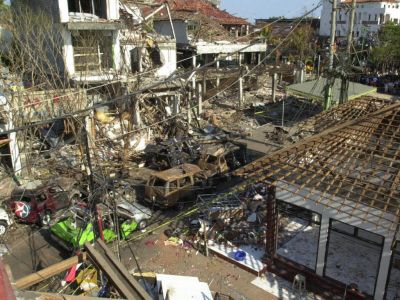The controversial Islamic cleric and alleged mastermind of the 2002 Bali Bombings, Abu Bakar Ba'asyir, 82, was freed from an Indonesian jail on Friday (January 8) morning. He was sentenced to 15 years in jail in 2011 for his role in the bombings. But considering his age and good behavior in prison, his sentence was cut down by 55 months, drawing widespread condemnation.
Ba'asyir was the teacher at an al-Qaeda affiliated terrorist organization named Jemaah Islamiyah (JI) when the group set off bombs in two Bali nightclubs — Paddy's Irish Bar and Sari Club — and outside the US consulate on October 12, 2002, killing 202 and injuring 209 people from 21 nations.
He was put behind bars in 2005 for his involvement in the Bali bombings but was later acquitted after an appeal. However, he was given a 15-year prison sentence in 2011 for his ties to Islamic militant training camps in Aceh, Indonesia. The Islamic cleric was also thought to be the spiritual inspiration behind the Bali bombings. After spending 10 years in Gunung Sindur prison in Bogor, Ba'asyir was released at 5.30 AM Friday to "avoid crowd".

His lawyer, Achmad Michdan, said, Ba'asyir would continue to teach. "He is yet to be satisfied in terms of teaching. He still wants to teach. As long as he still breathes, his duty is to teach, that's what he said," Michdan told ABC Australia.
Allegiance to al-Qaeda and ISIS
Ba'asyir was arrested during Indonesian President Suharto's rule in 1978 for refusing to accept a secular Indonesia. After his release in 1982, he was charged in the 1985 Borobudur Buddhist temple bombing but he fled to Malaysia. During this time, he continued to teach Islam in Malaysia and Singapore and began supporting al-Qaeda, according to the US intelligence agencies.
He returned to Indonesia in 1999 and continued to advocate for Sharia law. As per the intelligence community, his teachings inspired the 2002 Bali bombings that he denied. Ali Imron, one of the convicts for the Bali bombings, told Al Jazeera that Ba'asyir was not involved.
In 2014, Ba'asyir publicly pledged allegiance to ISIS and its then-leader Abu Bakar al-Baghdadi, who was killed in 2019. Now, at 82, Ba'asyir might not be the same as before but he continues to have a great influence in the country whose citizens have been involved in the 2019 Philippines church bombings that killed 20.



With ISIS activities shifting to Southeast Asia, Ba'asyir could be a morale boost for militants, as per Judith Jacob, London School of Economics' terrorism and security analyst. Now that he has a larger audience thanks to the internet and social media, the cleric could pose a greater security threat in the coming days.
"Ba'asyir's release will be a bit of a morale boost for beleaguered militants as they will likely be able to crow about how it is a form of defeat for the state and a triumph for true believers who stay the course," Jacobs told Al Jazeera, adding that Ba'asyir will be able to perpetuate jihad more easily.
Widespread Condemnation
Many see Ba'asyir's release as giving in to Islamic extremism in Indonesia. Sandra Thompson, whose 29-year-old son, Clint Thompson, was amongst the 88 Australians killed in the suicide bombings, told ABC that he should have served 202 life sentences for his crime.
"He didn't just kill one person, he killed 202. This man killed 202 people and that's how many life sentences he should serve. He hasn't repented, he hasn't said he's sorry, he still thinks it was the right thing, so why wouldn't he go back and teach young Muslims his hate all over again?" she said.
UK citizen Garil Arnandha, whose father was killed in the bombings, told BBC that Ba'asyir will still be a very dangerous person. "I don't agree with Abu Bakar Ba'asyir being released because in my opinion he is still very dangerous and has the potential to revive terrorism in Indonesia," he said.
Australian Prime Minister Scott Morrison said it was distressing that Ba'asyir was freed. "This is very distressing to the friends and families of the 88 Australians. It's hard, and it's gut-wrenching, having spent time with the families of those victims, of that terrible bombing," he said on Friday, January 8.








